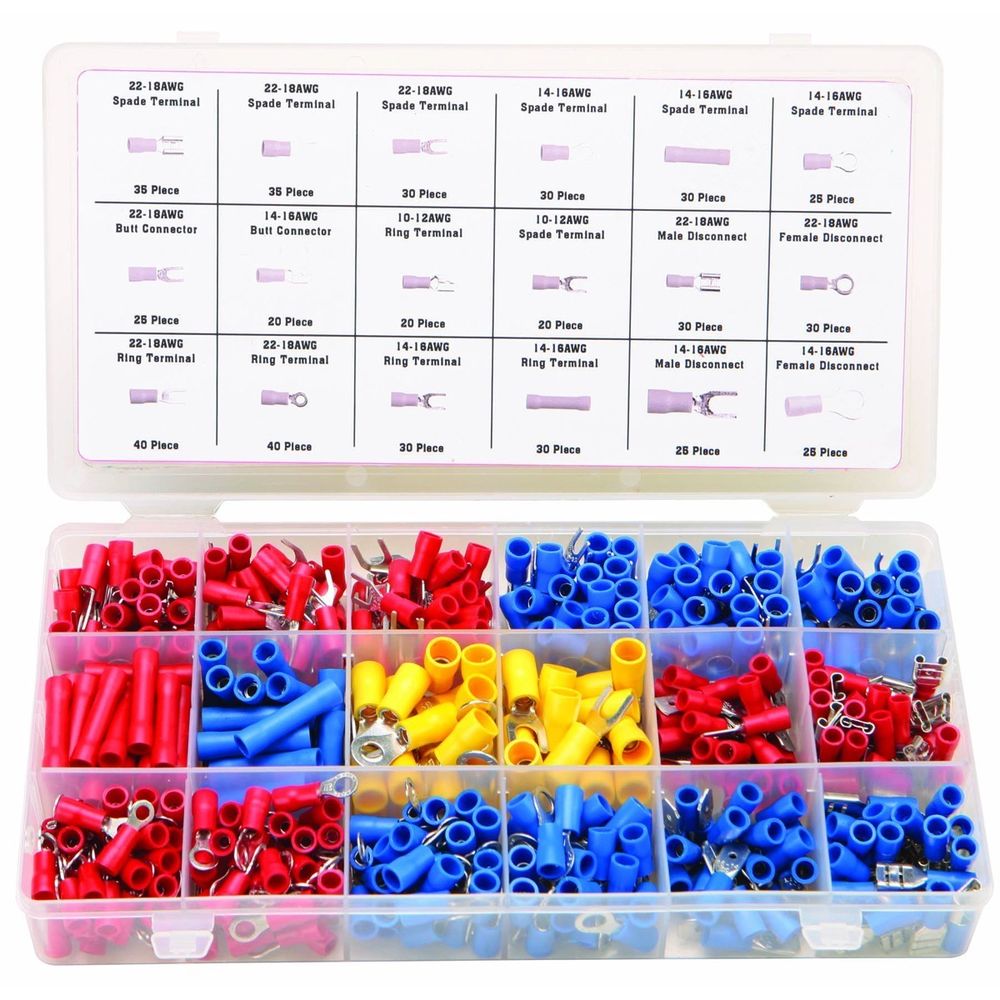Ever stare at a tangled mess of wires and wonder how they all connect safely and efficiently? The unsung heroes of the electrical world, wire terminals, are the key. These small but mighty connectors play a crucial role in everything from your car’s ignition system to the intricate circuitry of a spaceship. Understanding the various types of wire terminals is essential for anyone working with electrical systems, whether a professional electrician or a DIY enthusiast.
So, what exactly are these magical connectors? Wire terminals, in their simplest form, are metal components designed to securely attach wires to other components, like circuit boards, switches, or other wires. They come in a dizzying array of shapes, sizes, and materials, each tailored for specific applications and wire gauges. Think of them as the handshake between different parts of an electrical circuit, ensuring a smooth and reliable flow of electricity.
Imagine trying to connect a wire directly to a battery terminal. It’s awkward, unstable, and potentially dangerous. Wire terminals provide a standardized and secure way to make these connections, preventing loose wires, short circuits, and potential fire hazards. They are the unsung heroes of electrical safety, quietly ensuring that our devices work as intended.
The history of wire terminals is intertwined with the development of electricity itself. As electrical systems became more complex, the need for reliable and efficient connection methods grew. Early terminals were often crude, hand-made affairs. But over time, as technology advanced, so did the design and manufacturing of these critical components. Today, we have a vast selection of highly specialized terminals designed for everything from high-voltage applications to delicate electronic circuits.
Selecting the right wire terminal type is crucial for a safe and functional electrical system. Using the wrong terminal can lead to poor connections, increased resistance, and even component failure. Factors like wire gauge, current requirements, and environmental conditions all play a role in choosing the appropriate terminal. This guide will delve into the diverse world of wire terminals, exploring the different types, their applications, and best practices for ensuring secure and reliable connections.
Ring terminals, for instance, are commonly used for connecting wires to screw terminals. Spade terminals offer quick and easy disconnections. Butt connectors join two wires together, while quick-disconnect terminals allow for easy plugging and unplugging of components. Each terminal type has its own unique advantages, making it suitable for specific applications.
Benefits of using the correct wire terminals include improved safety, enhanced reliability, and simplified assembly. Properly crimped terminals create secure connections that minimize the risk of loose wires and short circuits. Standardized terminals also simplify the assembly process, making it easier to connect and disconnect components.
When selecting wire terminals, consider the wire gauge, current rating, and environmental conditions. Use the appropriate crimping tool to ensure a secure connection. Inspect the crimped connection to ensure it’s tight and free from defects.
Advantages and Disadvantages of Different Wire Terminal Types
| Terminal Type | Advantages | Disadvantages |
|---|---|---|
| Ring Terminal | Secure connection to screw terminals | Requires access to screw terminals |
| Spade Terminal | Easy disconnection | May not be as secure as ring terminals |
Best Practices: 1. Use the correct crimping tool. 2. Match the terminal to the wire gauge. 3. Inspect the crimped connection. 4. Use heat shrink tubing for added protection. 5. Consider environmental conditions.
Examples: Ring terminals in car battery connections, spade terminals in appliance wiring, butt connectors in home wiring projects.
Challenges: Corrosion, loose connections, incorrect crimping. Solutions: Use corrosion-resistant terminals, ensure proper crimping, inspect connections regularly.
FAQ: What is a wire terminal? What are the different types of wire terminals? How do I choose the right wire terminal? How do I crimp a wire terminal? What is a ring terminal used for? What is a spade terminal used for? What is a butt connector used for? What is a quick-disconnect terminal used for?
Tips and Tricks: Use a wire stripper for clean wire stripping. Use heat shrink tubing for added insulation and protection. Practice crimping on scrap wire before working on a live circuit.
In conclusion, wire terminals are indispensable components in electrical systems. They provide secure, reliable, and efficient connections that are crucial for the proper functioning of countless devices. Understanding the different types of wire terminals, their applications, and best practices for their use is essential for anyone working with electrical systems. From the simplest household appliance to the most complex industrial machinery, wire terminals play a critical role in ensuring the safe and efficient flow of electricity. By choosing the right terminal and following proper installation procedures, you can enhance the safety, reliability, and longevity of your electrical systems. So, the next time you encounter a wire terminal, take a moment to appreciate the crucial role it plays in our electrified world. Invest time in learning more about the specifics of wire terminal selection and application within your particular field of interest. This knowledge will not only contribute to safer practices but also lead to more efficient and reliable electrical systems.
types of wire terminals - The Brass Coq
Wire Connector For 6 Gauge Wire - The Brass Coq
Types Of Electrical Connectors - The Brass Coq
Circuit Diagram Leonardo Wire Connector - The Brass Coq
How To Use Quick Connect Wiring Connectors - The Brass Coq
Types Of Wire Connectors - The Brass Coq
Relay Block Terminals at Carmen Cooper blog - The Brass Coq
Electrical Cable Connectors Types - The Brass Coq
Wire Crimp Connectors Color Code - The Brass Coq
Electric Wire Connectors Types - The Brass Coq
types of wire terminals - The Brass Coq
types of wire terminals - The Brass Coq
Types Of Wiring Connectors - The Brass Coq
Types Of Wire Crimp Connectors at Richard Metheny blog - The Brass Coq
Wire Connectors For 6 Gauge Wire - The Brass Coq













